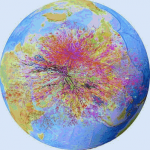Networks are not just Facebook etc. but also a way we have of understanding nature. Network Theory is a new realm of physics and it matters for management. We were recently asked what we now do differently since the Decalogue methodology, based on Deming and the Theory of Constraints, has become informed by Network Theory. Both Deming and Goldratt were physicists (as is our Founder Dr. Domenico Lepore). Physics, as opposed to engineering, has the aim of understanding how the universe works. We now know scientifically that nature is made up of networks, and this applies to organizations and economies too. To ignore this fact is to ignore a fundamental aspect of how reality works. (For this reason alone, any consideration of breaking up the European union is fraught with dangerous implications.)
Understanding Organizations As Networks
When we examine an organization in the light of network theory, we are able to unveil the network-like nature of the organization and analyze its behavior and development with a much deeper level of understanding. More importantly, we can consciously design, manage and operate the organization with a much higher level of optimization.
An organization can be viewed as a living, complex network with a precise goal. As such, it has nodes and hubs and it exhibits emergent properties. These are new structures or behaviors that emerge spontaneously from interconnection. We know that we can optimize the performance of a system by choosing a constraint and subordinating the rest of the system to the constraint. We can therefore optimize the performance of our organization by designing it as a network of projects in which certain resources are the hubs/constraints. By buffering the constraint, we are able to protect it from the accumulation of variation from the processes that feed it. In the same way, we need to protect the hub from variation, and by protecting the hub and subordinating to it, we ensure maximum performance for the entire network.
From Me to We
So what are we now aware of in our implementations thanks to Network Theory? The even greater and more urgent need for people to understand the concept so crucial in Deming, that progress can only come when people embrace a mindset of cooperation, unity and sharing, because of the interconnections and interdependencies. This is facilitated by having a constraint upon which to focus people’s efforts. As much of western culture is based on the idea of the success of the individual, trying to get people to work together towards a common goal instead of local optima when they are from different backgrounds educationally, socially and culturally, is one of our greatest challenges. People resist the idea of subordinating to the constraint, or being scheduled on a project. Working through this change takes enormous perseverance and total conviction in the value of a systemic understanding of human endeavor.
Not only does an organization need to be aware of its network properties; this new knowledge should also be shared by any Board of Directors and CEO. In this new Network paradigm, the role of the Board and of the CEO becomes that of influencers of the network. Also, those who govern the process of politics should be increasingly cognizant of the nature of networks and how to make networks sustainable. (We will discuss this further in a future post.)
Nobody can force organizations, or the people in them, to achieve their maximum. That is a matter of free choice. Our job is to facilitate progress in the knowledge that every success is a benefit to our entire network. Ultimately, we are all interconnected.
Sign up to our blog here and shift your thinking towards broader, systemic possibilities for yourself and your organization.
About the Author
Angela Montgomery Ph.D. is Partner and Co-founder of Intelligent Management and author of the business novel+ website The Human Constraint . This downloadable novel uses narrative to look at how the Deming approach and the Theory of Constraints can create the organization of the future, based on collaboration, network and social innovation. She is co-author with Dr. Domenico Lepore, founder, and Dr. Giovanni Siepe of ‘Quality, Involvement, Flow: The Systemic Organization’ from CRC Press, New York.






Great Post. TOC and logical reasoning are the best way to make things happen.
Warm Regards,
Dave Brahma.
Great Post!
What do you think about the knowledge communities?, since March last year I have been leading a company based on that type of business model. We have even had a lot of receptivity and the great barrier has been to overthrow the paradigms of our potential clients.
Thanks, Danilo! Sounds as though you are achieving a lot with your approach. We stress the importance of synchronization, so any knowledge that emerges needs to be part of a plan where finite resources are scheduled to ensure delivery.